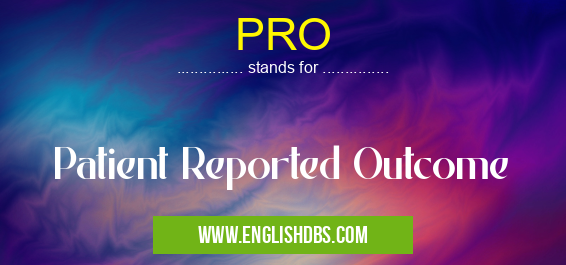What does PRO mean in HOSPITALS
Patient Reported Outcomes or PROs are measures used to assess the impact of a medical condition or treatment on a patient's experience and quality of life. These tools are generally self-administered surveys, and provide insight into the health-related issues that matter most to patients, rather than only relying on more traditional objective measures such as vital signs or laboratory results. PROs are increasingly being utilized by healthcare providers as an important component of clinical decision making and patient care.

PRO meaning in Hospitals in Medical
PRO mostly used in an acronym Hospitals in Category Medical that means Patient Reported Outcome
Shorthand: PRO,
Full Form: Patient Reported Outcome
For more information of "Patient Reported Outcome", see the section below.
Definition of PRO
Patient Reported Outcome (PRO) is a term used to describe clinically-relevant health outcomes reported by patients, including symptoms, functional status, quality of life, satisfaction with care, and events experienced by the patient over time. PROs can assess all dimensions of health from physical to mental and social functioning. They can also gauge subjective experiences such as pain intensity levels and fatigue.
Advantages of Using PRO
Using Patient Reported Outcomes has many advantages for both clinicians and patients alike. The information obtained through these tools is often more accurate than what could be determined through physician evaluation alone. This helps ensure that treatments being undertaken are achieving their intended goals in terms of improving patient conditions or preventing further deterioration. Additionally, because PRO questionnaires are self-administered at home by the patient they offer more convenience than traditional office visits which may involve traveling long distances or waiting times. PROs also provide valuable insight into what matters most to patients regarding their overall well-being, allowing providers to focus on targeted interventions that will make the most difference for each individual’s needs.
Essential Questions and Answers on Patient Reported Outcome in "MEDICAL»HOSP"
What is Patient Reported Outcome (PRO)?
Patient Reported Outcome (PRO) is a system of collecting information from patients that allows healthcare professionals to assess the effect of a treatment over time. It evaluates the patient’s experience and outcomes, which are beyond what can be measured clinically or objectively.
What benefits does PRO provide?
PRO provides a comprehensive assessment of how a condition affects an individual patient's daily living activities, functioning and overall wellbeing. It also enables healthcare providers to understand the impact of their treatment decisions on their patients' health and lives.
How is data collected for PRO?
Data for PRO is usually collected through surveys or questionnaires that are completed by patients as commonly used in clinical trials. Some PRO surveys may be completed on paper while others are administered online via computers or hand-held devices.
Who should complete PRO surveys?
The patient who is receiving treatment should complete the survey(s), though caregivers may occasionally assist with completion if needed. Numerically quantifiable answers such as number ratings, check boxes, or yes/no answers typically apply to most survey questions.
Does completing the survey require any special skills?
No special skills are required for completing these surveys but some medical knowledge may be necessary. Surveys vary widely, but all will generally include questions about symptoms you have experienced since beginning a particular treatment regimen and how those symptoms have changed over time.
Do PRO results need to be interpreted by a physician?
Yes, interpretation of the results should be done by physicians who closely follow up with each individual patient in order to ensure accuracy and draw meaningful conclusions from the data provided by PRODUCTS.
Are there any risks associated with using PROs?
No major risks have been linked with using PROs; however it is important to note that incorrect responses could lead to false conclusions being drawn upon review of the survey results. Therefore accurate responses are essential when completing these surveys.
What if I forget to answer some questions in my survey?
If you do not answer all elements within your survey it will not affect your overall score; however it will affect how healthcare providers interpret your results as every piece of information helps paint an accurate picture of your health status.
How often do I need to fill out PROs?
The frequency at which PROs must be completed varies from study-to-study depending on its individual objectives and protocols; however they can range from once-per-week intervals up to monthly intervals for long-term studies.
Final Words:
In summary, using Patient Reported Outcomes is becoming increasingly popular in contemporary health practice as a tool for obtaining more accurate views regarding a patient’s condition or overall health status in combination with traditional methods like physical examinations or laboratory tests. Through improved accuracy and convenience it gives clinicians access to invaluable insights about what matters most to each individual when managing their care plans and provides helpful data points that can guide decisions regarding both short and long-term treatments for optimal outcomes..
